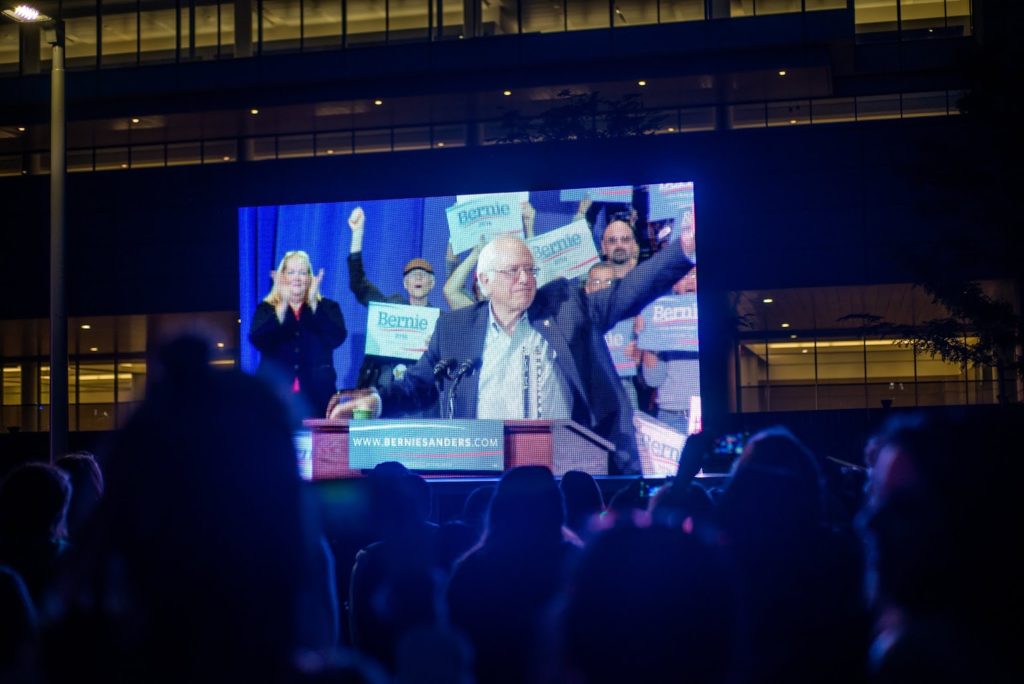By Elise Harmon, news editor
With supporters piled into seats and spilling over onto the lawn outside, Sen. Bernie Sanders, I-Vt., presented a populist agenda, touted the numerous small donations fueling his campaign and pledged a grassroots overhaul of American politics to a crowd of over 20,000 at the Boston Convention and Exhibition Center on Saturday.
“Please envision a nation where everyone, no matter their race, their religion, their disability or their sexual orientation, realizes the full promise of equality that is our birthright as Americans,” Sanders said. “Thank you all for being here. Thank you, and welcome to the political revolution.”
In his address, Sanders mentioned several of his platform’s key tenets, including income inequality, health care, campaign finance reform and environmental protection.
Sanders began his speech by thanking his supporters for campaign contributions, the campaign recently announced having raised $40 million without any contributions from super PACs. Super PACs – groups that can accept unlimited political donations and funnel that money to candidates and causes – have drawn the ire of Sanders and others who say their nature makes elections less democratic.
“650,000 Americans made contributions averaging $30 apiece, and 99 percent of those contributions were $100 or less,” he said. “In other words, we are running a people’s campaign.”
Sanders said that since the 2010 Citizens United v. Federal Election Commission decision that made super PAC funding of elections legal, the United States has become an oligarchy.
“One of our tasks, together, is to overturn this Citizens United decision and move towards public funding of elections,” he said.
He continued by addressing income inequality and what he called the unspoken tragedy of youth unemployment, advocating for a comprehensive jobs program and for the federal minimum wage to increase to $15 over the course of the next several years.
Sanders then concentrated on prison reform. He also addressed loopholes in gun laws, free public college education and environmental concerns, specifically in regards to Republicans voting against environmental regulations.
“I understand that you are funded by the Koch brothers and people in the fossil fuel industry,” Sanders said. “But instead of worrying about your campaign contributions, worry about your kids and your grandchildren.”
Although organizers didn’t announce a precise count of the crowd’s size, it more than doubled the 10,000 supporters who turned out for Obama’s primary rally in 2008, according to the Boston Globe. The event, which began at 6 p.m., followed a rally in Springfield at 2 p.m. that attracted a crowd of 6,000.
“The energy was really, really high,” Alex Jackson, a sophomore mechanical engineering major and member of Northeastern Students for Bernie, the university’s chapter of College Students for Bernie, said. “I’ve never seen a group of people so excited about anything outside of a concert before. It was like he was a rock star.”
The crowd’s size and diversity reflected the broad appeal that Sanders has been generating, according to Jackson.
“What stood out to me the most was the diversity [at the rally],” Jackson said. “You would expect there to be a lot of college students, which there were, but there were also older people and people of all different races… I guess that speaks to how he’s been running his campaign, the crowd that he drew.”
The rally was not without controversy: event staffers forced members of the activist group Students for Justice in Palestine to leave after the students displayed a pro-Palestine sign, Boston.com reported. Sanders later apologized, saying the students should not have been asked to leave.
Sanders, who grew up in Brooklyn, N.Y., is currently serving his second term as a US senator for Vermont. Before that, he served as mayor of Burlington, Vt. for eight years and as a member of the US House of Representatives for eight terms. Before he went into politics, Sanders worked as a carpenter and documentary filmmaker in Vermont.
Sanders was introduced by four locals: Karen Higgins, the National Nurses United union co-president and a nurse at Boston Medical Center; Jimmy O’Brien, the president of the Boston Carmen’s union; Jillian Brelsford, a nursing student at the University of Massachusetts Boston; and Bill McKibben, a climate change activist.
“He is that rare politician who says what he means and means what he says,” McKibben said. “No beating around the bush….Together, we’re building the kind of movement we need. This is a fight, and we’re going to keep fighting it right through the election.”
Multiple Northeastern students attended the rally to support Sanders, and several members of the student supporters’ group volunteered at the event.
“For me, my support has always been policy-oriented,” Will Smith, a sophomore political science major and co-president of Northeastern Students for Bernie, said. “I support a lot of the stuff that he talks about regarding economic inequality and taxes on major corporations.”
Smith’s group has 90 volunteers signed up and has held tabling events to promote Bernie Sanders at Northeastern and around Boston. Members are currently working with Sanders’ environmental team to create a website and work on campaign materials, Smith added.
Claribel Avila, a sophomore economics major, said she volunteered because she wanted to encourage people who wouldn’t normally vote to be active in the political process.
“I think that [Sanders] is very candid and is very sincere in what he’s promoting and what he says he going to do for people,” Avila said. “He’s also very consistent, which you don’t see a lot in politics anymore. I think that he has people’s interests at heart.”
Photo by Scotty Schenck









